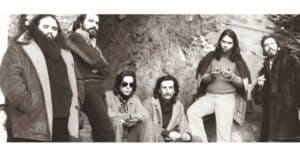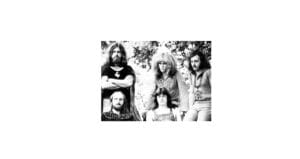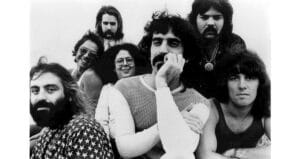UK: The Pioneers of Progressive Rock Fusion
UK was a British progressive rock supergroup formed in 1977 by some of the most accomplished musicians of the era. Combining technical virtuosity, complex compositions, and elements of jazz fusion, UK created a unique and influential sound that continues to inspire musicians in the progressive rock and jazz genres.
1. Formation and Background
The band originated after the breakup of King Crimson in 1974, with members seeking to form a new group. John Wetton, former bassist and vocalist of King Crimson, teamed up with Bill Bruford, another King Crimson alumnus, and virtuoso keyboardist and composer Eddie Jobson. The trio was soon joined by guitar icon Allan Holdsworth, known for his pioneering jazz-fusion style.
Original Lineup:
- John Wetton – Bass, vocals
- Eddie Jobson – Keyboards, electric violin
- Allan Holdsworth – Guitar
- Bill Bruford – Drums
This lineup featured a blend of progressive rock’s symphonic complexity, jazz fusion’s improvisational nature, and rock’s dynamic energy.
2. Key Albums and Musical Journey
1. UK (1978)
The band’s self-titled debut album showcased their technical skill and innovative compositions, blending intricate arrangements with a jazz-infused rock sensibility.
- Key Tracks: In the Dead of Night, Presto Vivace and Reprise, Thirty Years
- Sound: A mix of intricate time signatures, lush keyboards, fiery guitar solos, and Wetton’s powerful vocals.
- Interesting Fact: In the Dead of Night is considered one of progressive rock’s most iconic tracks, displaying the group’s masterful interplay.
2. Danger Money (1979)
Following Holdsworth and Bruford’s departure, UK continued as a trio with Terry Bozzio on drums. This album leaned more toward structured progressive rock, with less emphasis on jazz fusion.
- Key Tracks: Rendezvous 6:02, The Only Thing She Needs, Caesar’s Palace Blues
- Sound: More melodic and polished, with Jobson’s keyboards and violin taking center stage.
- Interesting Fact: The title track, Danger Money, critiques the excesses of the music industry.
3. Night After Night (1979)
This live album captured the band’s electrifying stage performances, featuring tracks from both studio albums along with previously unreleased material.
- Key Tracks: Night After Night, As Long as You Want Me Here
- Sound: A high-energy showcase of the band’s technical precision and emotional intensity.
3. Notable Members and Their Contributions
- John Wetton: As the bassist, vocalist, and primary lyricist, Wetton’s commanding voice and melodic bass lines defined UK’s sound.
- Eddie Jobson: A multi-instrumentalist, Jobson’s virtuosic keyboard and violin work brought a symphonic and avant-garde edge to the music.
- Allan Holdsworth: His jazz-fusion guitar style added a unique texture to the debut album, blending fluid improvisation with progressive rock.
- Bill Bruford: Known for his work with Yes and King Crimson, Bruford’s innovative drumming added a dynamic and intricate rhythmic foundation.
- Terry Bozzio: Joining after Bruford’s departure, Bozzio brought a powerful, energetic drumming style that complemented the trio format.
4. Musical Style and Themes
UK’s music combined elements of:
- Progressive Rock: Complex time signatures, symphonic arrangements, and extended compositions.
- Jazz Fusion: Improvisational solos, intricate instrumental interplay, and harmonically adventurous compositions.
- Electronic Elements: Jobson’s use of synthesizers and electric violin added a futuristic, experimental quality to their sound.
Lyrical Themes:
- Alienation and introspection (Rendezvous 6:02)
- Social and political critique (Danger Money)
- Surreal and abstract storytelling (In the Dead of Night)
5. Discography Overview
- UK (1978) – A groundbreaking debut blending prog rock and jazz fusion.
- Danger Money (1979) – A more melodic, structured follow-up.
- Night After Night (1979) – A live album capturing their electrifying performances.
6. Legacy and Influence
Although UK’s existence was short-lived (1977–1980), their influence on progressive rock and jazz fusion was profound. They pushed the boundaries of technical proficiency and composition, inspiring countless musicians in the decades to follow.
Influenced Artists:
- Dream Theater: For their blend of progressive rock and technical mastery.
- Porcupine Tree: For their experimental and atmospheric approach.
- The Aristocrats: For their fusion of rock and jazz virtuosity.
Similar Bands:
- King Crimson: For their shared members and avant-garde influence.
- Yes: For their symphonic progressive rock style.
- Mahavishnu Orchestra: For their jazz-fusion virtuosity.
7. Interesting Facts
- Rick Wakeman’s Replacement: Eddie Jobson initially joined Yes briefly as Rick Wakeman’s replacement before forming UK.
- Short Lifespan, Lasting Impact: Despite releasing only two studio albums, UK’s legacy in progressive rock is immense, with their debut often cited as a masterpiece of the genre.
- Innovative Violin Work: Jobson’s use of the electric violin in a rock context was groundbreaking, blending classical and futuristic elements.
8. Reunion and Modern Activity
In 2012, Eddie Jobson and John Wetton reunited under the UK banner for a series of live performances. These shows celebrated the band’s music and introduced it to a new generation of fans. Sadly, John Wetton passed away in 2017, marking the end of any future UK activity.
9. Conclusion
UK was a trailblazer in combining the technical brilliance of jazz fusion with the grandeur of progressive rock. Their music remains a benchmark for innovation, virtuosity, and emotional depth. Whether through the soaring melodies of Rendezvous 6:02 or the breathtaking complexity of In the Dead of Night, UK’s legacy endures as one of the most innovative supergroups of the 1970s.




